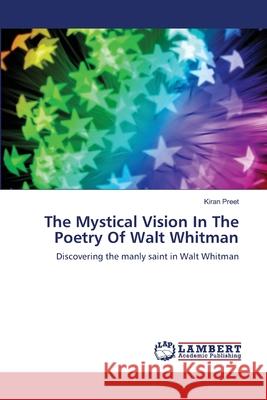The Mystical Vision In The Poetry Of Walt Whitman » książka
The Mystical Vision In The Poetry Of Walt Whitman
ISBN-13: 9783659350757 / Angielski / Miękka / 2013 / 168 str.
The book deals with the mystical vision of Walt Whitman, the great transcendentalist poet of America. The thrust of the research work is on discovering the message of the messianic in Walt Whitman. Exploration of his works including his magnum opus 'The Leaves of Grass' shows several mystical traits which are peculiar to him and set him apart as a mystic with a vision of reality encompassing, not only the divine, but the temporal world also. In general, mystics keep their eyes closed to the life that is lived around them, and focus on the inner reality, and the inner being of man. They believe in doing away with the beauties of this world, which they condemn as temptations to wean the soul away from the path of godliness. But in case of Walt Whitman, he appears to have transcended that phase of enlightenment. And this enlightenment has actually opened up new vistas of the physical world in front of him. He does not turn his head away from the ugliness of the world. This study finds Walt Whitman as a manly saint, a saint who has not relinquished life, a saint, who after experiencing union with the Master, has not satisfied himself by closing the eyes on the problems of the world.
The book deals with the mystical vision of Walt Whitman, the great transcendentalist poet of America. The thrust of the research work is on discovering the message of the messianic in Walt Whitman. Exploration of his works including his magnum opus The Leaves of Grass shows several mystical traits which are peculiar to him and set him apart as a mystic with a vision of reality encompassing, not only the divine, but the temporal world also. In general, mystics keep their eyes closed to the life that is lived around them, and focus on the inner reality, and the inner being of man. They believe in doing away with the beauties of this world, which they condemn as temptations to wean the soul away from the path of godliness. But in case of Walt Whitman, he appears to have transcended that phase of enlightenment. And this enlightenment has actually opened up new vistas of the physical world in front of him. He does not turn his head away from the ugliness of the world. This study finds Walt Whitman as a manly saint, a saint who has not relinquished life, a saint, who after experiencing union with the Master, has not satisfied himself by closing the eyes on the problems of the world.











